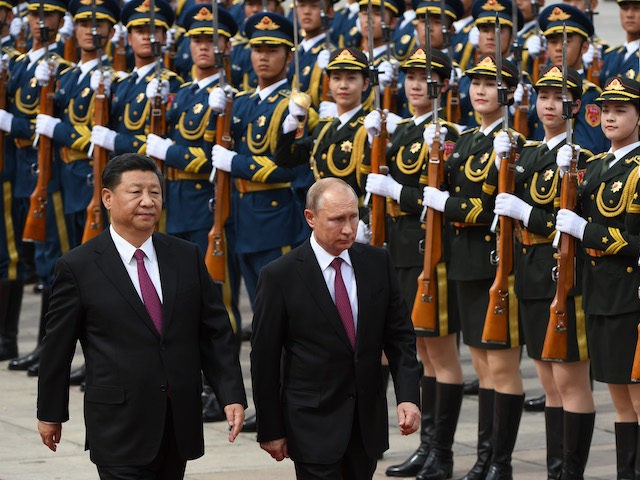China and Russia began joint military drills in the former’s northwestern region on Monday amid the U.S. withdrawal from Afghanistan and renewed efforts by both to become more relevant players there.
Taking place in the Ningxia Hui Autonomous Region, the Zapad/Interaction-2021 exercises will last throughout the week before concluding on Friday, per the Chinese state propaganda outlet the Global Times. Ningxia Hui is a landlocked, internal territory of China and does not immediately border any neighboring nations. The Hui people of China are a predominantly Muslim population who have expressed concern with communist persecution given the genocide of the ethnic Uyghur Muslim people in western Xinjiang, a Chinese region that borders Afghanistan.
The Chinese Defense Ministry noted that the drills would include over 10,000 troops from the People’s Liberation Army’s (PLA) Western Theater Command and Russia’s Eastern Military District. They will also feature an array of military hardware including aircraft, armored vehicles, and artillery.
State media made much of the presence of the PLA’s J-20 stealth fighter jets and Y-20 transport planes, noting the drills marked the first time the former featured in joint drills with another country. The Global Times asserted that the presence of the PLA’s “advanced hardware,” along with the Russians making use of Chinese weapons and equipment, was indicative of a “high-level of cooperation and mutual trust between the Chinese and Russian militaries.”
Russia’s Defense Ministry asserted the drills aimed to “increase the level of military cooperation and friendship between the armed forces of the two countries, demonstrate the determination and ability of Russia and China to fight terrorism and jointly protect peace and stability in the region,” according to the Moscow Times.
The Russian outlet emphasized the drills were part of Russia’s diplomatic “pivoting” toward China following the 2014 annexation of Crimea and the subsequent deterioration of relations between Moscow and Western Europe. China’s Global Times did not mention Crimea, but asserted both Moscow and Beijing are “facing suppression from the US.”
Though Russia and China do not have a formal military alliance, they have conducted joint drills since 2005, and Russian leader Vladimir Putin has previously teased the potential for such an arrangement to materialize in the future, the Moscow Times noted.
Both China and Russia have attempted to elevate their profiles in Afghanistan in light of President Joe Biden claiming the U.S. military would fully withdraw from that country by the end of August. Biden’s extension of the withdrawal date from May to September – and then reversion to August 31 – has prompted a wave of Taliban military operations that have significantly expanded the terrorist group’s influence and inspired fears that it would soon conquer the entire country after American troops leave.
Ongoing Taliban advances in Afghanistan have already made problems for the country’s immediate neighbors and prompted military action from Russia to handle the fallout from the group’s successes. The government of Tajikistan confirmed in early July that over 1,000 Afghan soldiers had thrown down their arms and fled over the border rather than check the Taliban advance through Badakhshan, one of the key Afghan border provinces. Dushanbe has requested military aid from Russia through the Collective Security Treaty Organization (CSTO) a military cooperation bloc of former Soviet Republics. Russia has promised to honor that call and bolster the Tajik military, according to the Agence France-Presse.
Russia and China increasingly seem to expect a Taliban victory in the conflict, hosting diplomatic envoys from the terrorist group attempting to assure the major powers that Afghanistan would not harbor terrorists again under the group’s restored rule. China, for its part, has offered kind words for the group, while warning it to maintain friendly relations with its neighbors.
As of Monday, the Taliban claimed to have concurred six provincial capitals, including the major cities of Kunduz, Sheberghan, and Sar-e-Pul, though Kabul has contested the Taliban’s claims to have fully secured the cities.

COMMENTS
Please let us know if you're having issues with commenting.